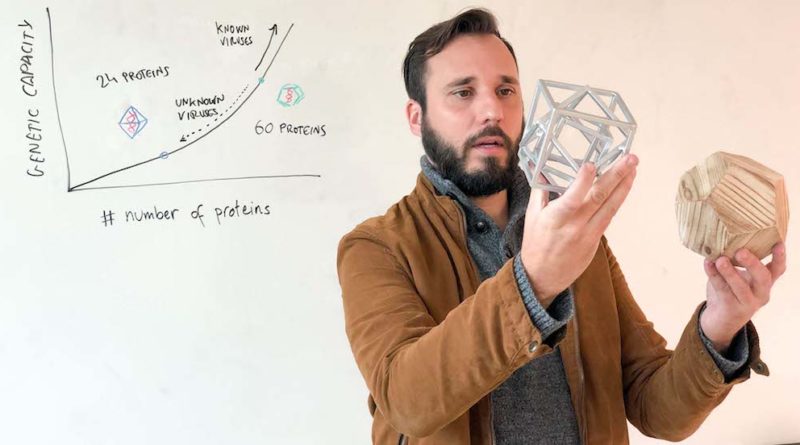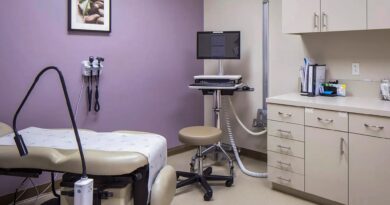Daily Business Report: Tuesday, Dec. 28, 2021
Tracing the origin of viruses
SDSU’s Viral Information Institute is exploring theories on whether some viruses pop up spontaneously.
By Sarah White | SDSU
Nearly two years into a global pandemic, it is apparent that viruses like COVID-19 mutate and evolve into new variants quickly. But what conditions allow for new viruses to emerge in the first place?
An interdisciplinary team of biologists and mathematicians at San Diego State University, led by Forest Rohwer, Anca Segall, Rob Edwards, and Antoni Luque, recently received $1.5 million from the Gordon and Betty Moore Foundation to answer this question.
Viruses are considered parasites because they require a host cell’s machinery to reproduce. A virus can evolve if its genetic material allows it to be a more effective virus (i.e., replicate more) and if its genetic material leads to more successful survival of its host cell.
Scientists who study viruses are still trying to determine whether new viruses are always adapting from already existing viruses or if they arise spontaneously.
TOP PHOTO: An interdisciplinary research team is probing the origins of viruses. Above, Antoni Luque holds models of two viral capsids.
Holland America Line’s Zuiderdam
resumes service from Port of San Diego
Holland America Line’s Zuiderdam returned to service last week from Port of San Diego, the second Holland America ship to resume service in San Diego since the industrywide pause.
Zuiderdam joins Koningsdam, which resumed service in San Diego Oct. 10. Holland America Line now has six ships cruising again in the Caribbean, Mexico and along the Pacific Coast of the United States.
Zuiderdam’s first cruise is a 10-day “Mexico and Sea of Cortez” that will be followed by Panama Canal departures and a grand 35-day South Pacific sojourn and Pacific cruise. Koningsdam sails a series of seven-day cruises to the California Coast or Mexico and two longer Hawaii voyages that run through April 3, 2022. Eurodam and Nieuw Amsterdam each make one call at San Diego in spring 2022.

New grant to support safe driving program
to curb traffic injuries and deaths
By Michelle Brubaker | UC San Diego
Researchers at University of California San Diego School of Medicine will continue to work with law enforcement and health professionals to develop educational programs and interventions that reduce traffic-related injuries and deaths.
With funding from the California Office of Traffic Safety through the National Highway Traffic Safety Administration (NHTSA), the UC San Diego Training, Research and Education for Driving Safety Program (TREDS) aims to educate drivers and pedestrians about making safety the number one priority when sharing the roadways.
In California, there were 3,911 crash-related fatalities in 2020. The leading causes of these crashes were impaired driving, improper turn and speeding, all related to driver behavior and considered preventable.
Through the program, train-the-trainer courses are available to prepare law enforcement, clinicians and other traffic safety professionals to educate the public in the communities they serve.
Brandi Taylor elected partner at
Eversheds Sutherland law firm
Brandi A. Taylor has been elected partner at the San Diego office of Eversheds Sutherland law firm.
Taylor counsels technology companies in product development with a focus on global data privacy compliance. She regularly advises clients building and integrating emerging technologies, including augmented and virtual reality, as well as video game developers and social media platforms.
She also assists companies in preparing and implementing multijurisdictional privacy compliance programs.
More than 50 local newsroom
launched during the pandemic
Nearly as many local newsletters also started publishing in that time
By Kristen Hare
The pandemic changed the news business and, in a lot of way, not for the better. It accelerated layoffs. It hastened the end of more than 100 news organizations. It led to a handful of newsrooms losing their actual newsrooms.
But in some communities, the pandemic also clarified the value of reliable information.
More than 50 local newsrooms launched in the United States in 2020 and 2021. Nearly as many local newsletters started publishing in that time. We (Poynter) found them in 27 states and Puerto Rico.
As they did before the pandemic, the majority of digital startups sprang up around major metro areas, said Penny Abernathy, visiting professor at Northwestern University’s Medill School of Journalism, Media, Integrated Marketing Communications. That happens thanks to better access to for-profit and philanthropic funding.
One of those is the San Diego Sun. About: “An informative and entertaining source of news, events and insider stories that define downtown San Diego and the greater metropolitan area.”
But Abernathy has been excited to see newsrooms launching in rural areas, including The Border Belt Independent in North Carolina.
California’s disputed gender diversity
law catapults record number of
women into corporate board seats
Despite ongoing legal challenges, California’s 2018 gender diversity law has helped propel a record number of women into corporate board seats in the San Diego region and statewide, according to a new study.
Women directors at San Diego publicly traded companies rose from 12 percent to 31 percent of total board seats since the law — SB 826 — passed three years ago, said the California Partners Project, an advocacy group tracking the impact of the legislation.
Across California, women now hold 29 percent of public company board seats, up from 15.5 percent in 2018.
A genetic data matchmaking service for researchers
Several years ago, Patrick Short assessed direct-to-consumer (DTC) genetic testing companies and found serious flaws. “I felt there were many ways that DTC genetic testing could be improved, such as giving people more ownership over how their data was being used,” Short explained.
At the time, he was working on his PhD in Mathematical Genomics and Medicine at the University of Cambridge and Wellcome Sanger Institute. During his studies, he realized there was also a need for researchers to have faster and better access to individuals willing to share their genetic data for research. In 2017, Short and fellow classmates William Jones and Charlotte Guzzo decided to fill these critical gaps and create their own company, Sano Genetics.
Today, Sano Genetics is matching thousands of people and their genetic data with research projects in the UK and Europe. In addition to offering DTC sequencing kits, customers can upload their genetic data from other sources to the Sano Genetics platform. Customers can then decide if, and when, they want to share their information with researchers. Scientists, in turn, can access this treasure trove of genetic and health information, all with the user’s consent. Through its work, Sano Genetics aims to make research easier and more streamlined, drive scientific discovery, and help people obtain more value from their genetic data.
City of San Diego recognized for assistance
in COVID-19 monitoring in wastewater
Two state agencies have formally recognized the City of San Diego’s Public Utilities Department for its assistance in monitoring wastewater in response to the COVID-19 pandemic.
The city’s Public Utilities Department was one of five California utilities that participated in the Center for Disease Control’s National Wastewater Surveillance System program in cooperation with the State Water Quality Control Board.
In addition, Public Utilities and other organizations were recognized by the California Water Monitoring Council for their wastewater monitoring efforts, including participating in the U.S. Department of Health and Human Services pilot studies to investigate the logistics of implementing wastewater-based epidemiology nationally.
“The monitoring of wastewater can provide key information that is helpful in understanding and preventing the spread of COVID-19,” said Shauna Lorance, director of the Public Utilities Department. “We are very proud to continue providing assistance to state and federal agencies with these efforts.”
Public Utilities and several other California agencies and institutions pioneered an approach that better assesses the spread of COVID-19 through testing wastewater, according to the State Water Quality Control Board. This approach yields information about the prevalence of the diseases in populations several days sooner than individual testing and hospitalization records, the board stated.





